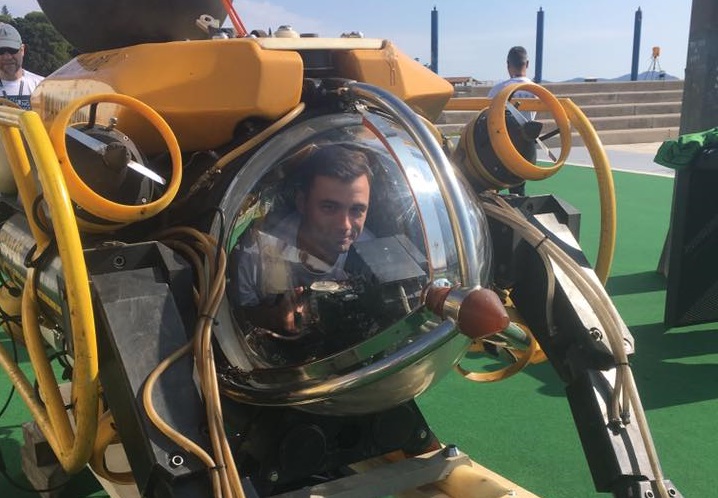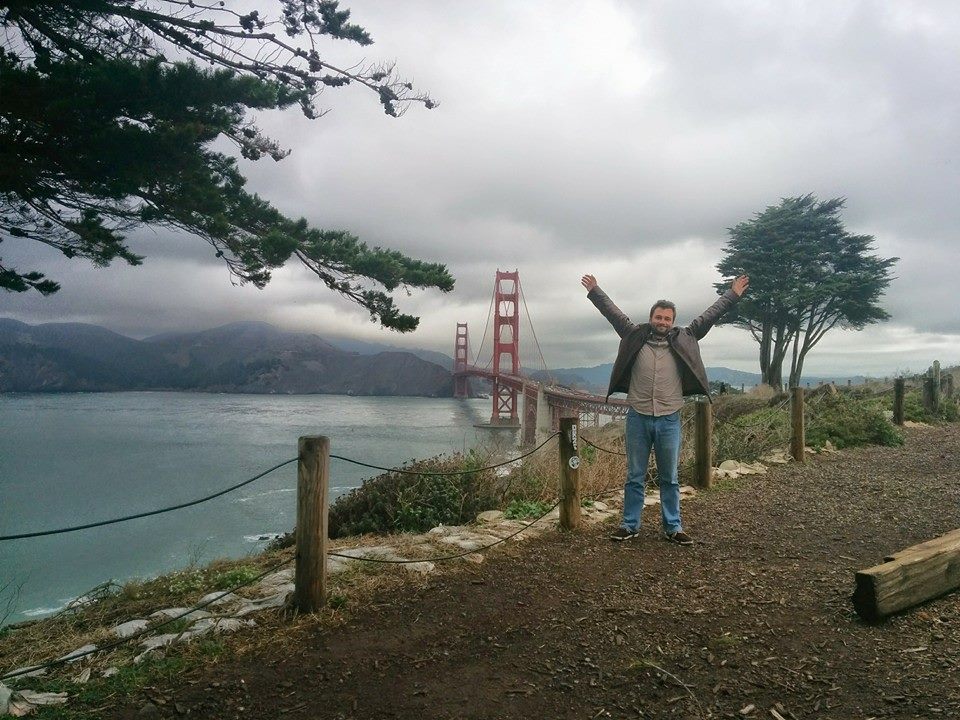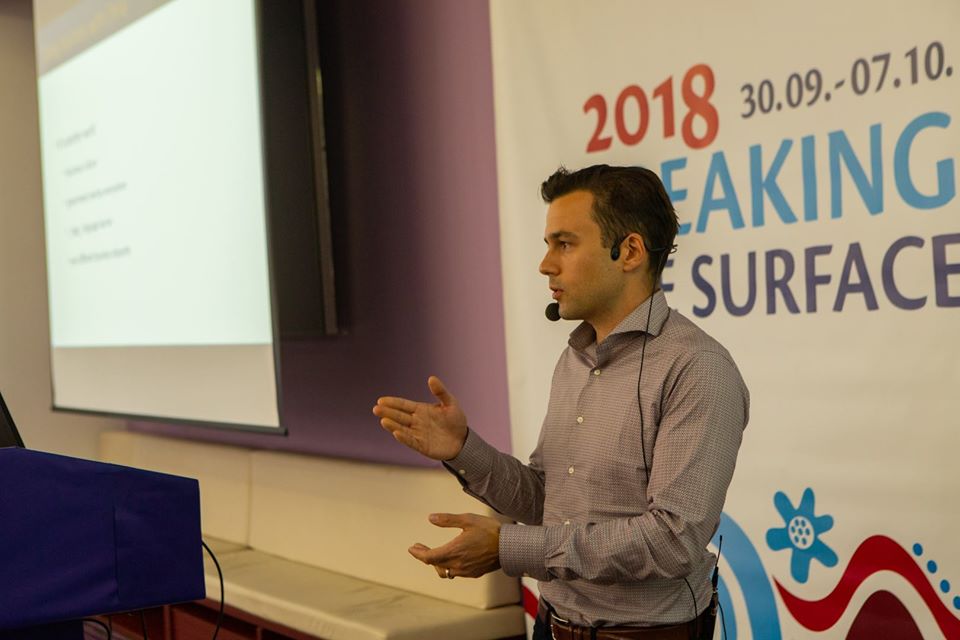Marin Bek, electrical engineer and co-founder of Ascalia and Kraken Systems, reflects on his life and success for Generacija NOW, a Hrvatski telekom project, in the form of a recent letter to his younger self. After graduating from FER (University of Zagreb, Faculty of Electrical Engineering and Computing), he moved to America and found a job there, but eventually returned to Čakovec, Croatia. Today, at age 33, he runs two very successful companies.
When he was a kid in elementary school, he was dismantling TVs and burning things. And it was obvious to everyone that he wouldn’t study history but something STEM-related (Science, Technology, Engineering, Mathematics). He often went cycling with his mom, and while they rode together, she tried to figure out what he wanted to do with his life. He entered eighth grade and he told her that he wanted to be a programmer and work in California. Then he completed his degree in electrical engineering and computer science and lived in California for a while. After a few years, he returned from America to Čakovec, Croatia and started an IT company and later a tech startup there. It might have seemed like an odd path to his peers, but he knew that he had made the right decision because it is not important where you work in IT, but the kind of work you do.
Computer Whiz
Everyone in elementary school was interested in technology, but when he chose a high school, he encountered prejudice for the first time. He didn’t want to enroll in high school and chose the technical middle school in Čakovec instead, and since that school was not at its best, his former professors slandered him. They also summoned his mom to school and recommended that she take him out of technical school and enroll him in high school. And then his cousin Siniša, who had graduated from FER and the technical school in Varaždin, advised Marin’s mother to allow Marin to study what he wanted. Fortunately, she understood and gave him that choice.
The technical middle school was too easy for him. He was 16 years old, and advanced to the second level. Everything went smoothly, even though he wasn’t learning anything, and that’s how it remained until he enrolled in FER. However, he found math so difficult there that he nearly lost a year and almost dropped out of college; but he advanced (barely). It took him some time to get used to the fact that things were not as simple as they were in high school, and he would have to study harder.
Working Full-time in College
He started working full time at Bosch during his second semester of college so that he could stay in Zagreb. He skipped typical student life and extended his studies to six and a half years. After working at Bosch for a few years, he had had enough of small programming jobs and he quit. Then he started working for the Austrian company AVL, and stayed there until leaving for America.
In the summer before his third year of college, he took a bus from Zadar to Čakovec. Among the documentaries shown during the bus ride was one about underwater robots exploring the Titanic. Seeing this encouraged him to enroll in a seminar on electrical engineering and the design of autonomous robots. He enjoyed this seminar and his professors persuaded him to switch from computers to electronics.

Autonomous Underwater Diver
He remained at AVL and his seminar paper turned into a graduate thesis. Then he made his own autonomous underwater diver, which was like a small underwater drone. Shortly before graduation, FER gave a lecture on startups, which still seemed like an abstract term back then. After that lecture, he spoke to the lecturer and Vladimir de Franceschi, a startup lawyer who worked in Silicon Valley, and told them about his autonomous diver. The lawyer like what he heard and suggested that he apply for the Startup Accelerator Program at the US-based Founder Institute in Zagreb, and later helped him with his startup in San Francisco.
After graduation he continued working at AVL. He wanted to enroll in the Founder Institute’s American Startup Accelerator Program but needed an investment of 3000 HRK, which he didn’t have. His grandmother had a stroke and he helped pay for her care. Then his mother became ill and he looked after her as well. After discussing options with friends, his cousin Siniša lent him the money which was a major turning point. In Zagreb, he became familiar with the startup culture through the accelerator program.

From Croatia to San Francisco
One afternoon in Čakovec in the winter of 2012, he cut off part of his thumb above the bone while splitting firewood for his mother. They saved his thumb and the three months of sick leave turned out to be a positive thing. During his time at home he realized that it was better to work alone than in an office, and started thinking about moving to San Francisco. He founded his first startup while still in Zagreb, and soon found a job online at the Nextuser startup so that he could pay rent, food and finance his own project. Many of his peers warned him of the risk of quitting a job at a well-off Austrian company to launch a startup with someone that he had met on the Internet, but he believed it would pay off in the end.
He enjoyed San Francisco, and like everyone else, he juggled several jobs while developing his startup. It was entirely commonplace there to be sitting in a cafe and have a waiter share an idea for a startup. He tried to get involved with marine technology and underwater drones but couldn’t obtain financing. Six and a half years later, he realizes that his idea was ahead of its time, and making it happen would have been extraordinarily expensive.
His project eventually failed, and he ran out of money, but quickly connected with people who would play a key role in his future. At Nextuser he had advanced from IT developer to CTO, and became involved with finding investors, which enhanced his knowledge and pool of acquaintances. However, he wanted to return to Croatia for his mom’s sake and didn’t want to get stuck in America forever. In 2013, he and his friend and colleague Dean Strbad launched an IT company called Kraken Systems which dealt with big data in Čakovec. For a while he lived on the Čakovec-San Francisco route. After two and a half years, he left Silicon Valley and returned to Croatia.
Return to Croatia
When he set up Kraken Systems in Čakovec, his critics thought it strange that he had not chosen Zagreb. But his reasons were based on logic: Dean, who is also from Čakovec, worked alongside him. He also set up a home office so that he would not have to rent a space. Besides, he wanted to be closer to his mom because she was ill and needed his help. And, he didn’t allow himself to be influenced by peer pressure, because he had been shaped by American business culture, and knew that the location of his firm was completely irrelevant.
He didn’t plan on working with Croatian clients anyway, and it didn’t matter to anyone in America whether the company is in Zagreb, Čakovec or Varaždin because they’d probably never heard of any of those cities. Also, in America, he never experienced prejudice regarding where he worked or where he came from. San Francisco is a melting pot, which is a positive aspect of life there. People arrive from all over the world and come from many different backgrounds.
However, after three and a half years, he decided to move the business to a more central location. His mother’s health didn’t improve, and he moved to Zadar, where it became apparent that he would never return to Čakovec. As he continued to add staff; he decided to rent offices in Zagreb. However, he kept an office in Čakovec, where three people are currently working.
Kraken Systems is a now a company with close to 1 million EUR in revenue and they work with clients like Carrefour, Nestlé, Ferrer and Forbes. Four years after Kraken Systems began operations, he launched Ascalia, another tech startup, and now has over 20 employees in both companies.
He found investors from Canada and Croatia and his new startup focuses on industry and helping factories to modernize. They use the benefits of technology to reduce environmental impact and overall costs while optimizing operations. He created software and devices which allow industrial machines, made from 1979 to the present, to connect to the Internet. This allows clients to run a smart factory without a major investment. He has continued to develop this company, which is active in London, Paris and Germany. Everywhere except Croatia.
These days he travels all over the world: one day he’s in Paris, the next day in Munich or London. He also travels through America, Europe and China for work.

Advice to Young Entrepreneurs
His advice to young entrepreneurs? Don’t hesitate to take risks and follow your instincts without overthinking things. There will be tough times and obstacles, but be persistent and don’t give up. Unfortunately, he no longer has any close relatives: mom, dad, or grandparents, so he doesn’t rule out living abroad again. Seven years ago, he was raising money for gas in Čakovec, and he never dreamed of achieving such success in his early thirties. He has no idea what his forties will bring. We’ll have to wait and see.
About Generacija NOW
Generacija NOW is a donor-sponsored program implemented by Hrvatski Telekom in partnership with the Institut za razvoj i inovativnost mladih (Institute for Youth Development and Innovation). In four years, more than HRK 4 million has been invested in preparing young people for jobs of the future, and the program works with more than 300 educational institutions across Croatia.
https://www.youtube.com/watch?v= bV2PR2qduDE
With the documentary “Generacija inspiracija” (Inspiration Generation), as well as a series of activities within the donation program, Hrvatski Telekom emphasizes the importance of investing in better education for all school age groups – so that they can successfully navigate life without missing out on opportunities provided by the latest technological advances. The importance of destroying preconceptions and prejudices must not be forgotten. And one of the more common preconceptions is that businesses cannot be started in smaller environments.
For more information on Croatian entrepreneurs and business in Croatia, follow our Business page here or our Made in Croatia page here.







